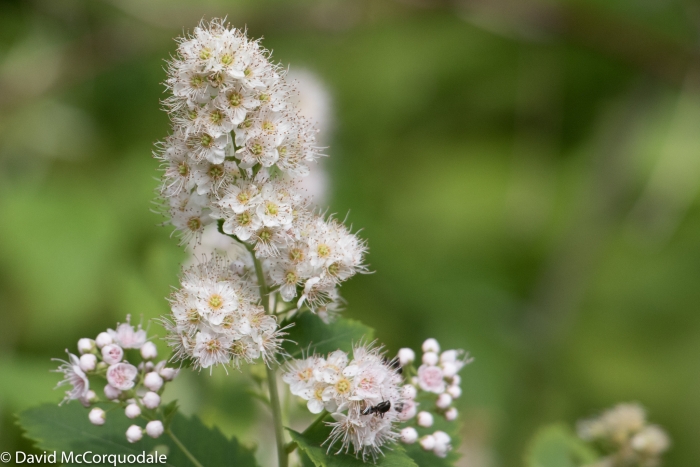White Meadowsweet
(Spiraea alba)
White Meadowsweet (Spiraea alba)
/
/

David McCorquodale
CC BY 4.0
Image By:
David McCorquodale
Recorded By:
Copyright:
CC BY 4.0
Copyright Notice:
Photo by: David McCorquodale | License Type: CC BY 4.0 | License URL: http://creativecommons.org/licenses/by/4.0/ | Rights Holder: David McCorquodale | Publisher: iNaturalist | Date Created: 2017-08-07T11:17:52-07:00 |



















































Estimated Native Range
Summary
Spiraea alba, commonly known as White Meadowsweet, is a deciduous shrub native to wet meadows, marshes, and the edges of streams and lakes in the Midwest and Northeast United States, as well as parts of Canada. It typically reaches 8 feet in height with a spread of 3–4 feet. White Meadowsweet is characterized by its upright form, glossy yellow-green, oblong or lance-shaped leaves with toothed margins, and tough, yellowish-brown twigs. The plant is particularly noted for its showy, fragrant white flowers that may have a pink tinge, blooming in spike-like clusters at the branch tips from early summer through September. In autumn, the foliage turns a golden yellow, and brown seed capsules, a distinctive feature of Spiraea species, persist after flowering.
White Meadowsweet is valued for its ability to attract butterflies and other beneficial insects with its nectar and pollen. The plant’s blooms are suitable for cut flower arrangements, and its fall color adds seasonal interest. It is often used in naturalistic plantings, rain gardens, and as part of wildlife-friendly landscapes. While it is adaptable to various soil types, it thrives in moist, well-drained soils and can tolerate occasional flooding. It prefers full sun to part shade. Although generally low-maintenance, it may require pruning to maintain shape and encourage new growth. It is also resistant to deer browsing. Historically, the hollow stems of Meadowsweet were used as pipe stems.CC BY-SA 4.0
White Meadowsweet is valued for its ability to attract butterflies and other beneficial insects with its nectar and pollen. The plant’s blooms are suitable for cut flower arrangements, and its fall color adds seasonal interest. It is often used in naturalistic plantings, rain gardens, and as part of wildlife-friendly landscapes. While it is adaptable to various soil types, it thrives in moist, well-drained soils and can tolerate occasional flooding. It prefers full sun to part shade. Although generally low-maintenance, it may require pruning to maintain shape and encourage new growth. It is also resistant to deer browsing. Historically, the hollow stems of Meadowsweet were used as pipe stems.CC BY-SA 4.0
Plant Description
- Plant Type: Shrub
- Height: 3-4 feet
- Width: 3-4 feet
- Growth Rate: Moderate
- Flower Color: White
- Flowering Season: Spring, Summer
- Leaf Retention: Deciduous
Growth Requirements
- Sun: Full Sun, Part Shade
- Water: Medium
- Drainage: Fast, Medium, Slow
Common Uses
Bee Garden, Bird Garden, Butterfly Garden, Deer Resistant, Erosion Control, Fire Resistant, Fragrant, Hedges, Hummingbird Garden, Low Maintenance, Rabbit Resistant, Showy Flowers, Street Planting
Natural Habitat
Wet meadows, marshes, and the edges of streams and lakes
Other Names
Common Names: Narrowleaf Meadowsweet, Pale Bridewort, Pipestem, Hvid Spiræa, Weißer Spierstrauch, Spirée Blanche, Witte Spirea, Vitspirea, Spirea
Scientific Names: , Spiraea alba, Spiraea alba var. alba, Spiraea salicifolia var. paniculata, Spiraea tomentosa var. alba, Eleiosina obovata, Spiraea alba f. paniculata, Spiraea alba subsp. alba, Spiraea alba var. typica, Spiraea paniculata
GBIF Accepted Name: Spiraea alba Du Roi